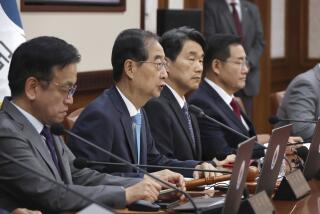N. Korea to revisit Japan abductions
TOKYO — North Korea agreed Friday to reopen investigations into the fate of Japanese citizens abducted by its spy service in the 1970s and ‘80s, breaking with past assertions that the abductees were dead and the issue was closed.
The loose agreement does not include details on how the investigations will proceed. But it offered the first sign of cooperation between North Korea and Japan after several years in which their relations have been frozen in mutual hostility.
In return for North Korea’s move, Japan agreed to drop a ban on travel between the two countries and said it would allow an exemption for humanitarian aid from the strict economic sanctions imposed after North Korea conducted a nuclear test in 2006.
North Korea’s concession appears to be aimed as much at paving the way to normalized relations with the United States as with improving ties with Japan. As part of a deal to end its secret nuclear program, North Korea has demanded that it be removed from the U.S. list of countries that sponsor terrorism, a step that would lift economic penalties that come with being on the list.
Critics in Washington have vigorously opposed delisting North Korea, saying the Bush administration’s eagerness to secure a deal has led it to ignore the country’s role in global nuclear proliferation. Japan has also lobbied forcefully against the delisting, contending that Pyongyang should not reap rewards until progress is made on the issue of the missing Japanese citizens.
In 2002, North Korean leader Kim Jong Il acknowledged that security services had kidnapped 13 people in order to train spies in Japanese language and culture. Kim allowed five to return to Japan but said the other eight were dead. Many Japanese believe that at least some might still be alive and that even more people could be missing.
The abductees’ fate is a highly charged issue in Japan, where the victims’ families and political allies have conducted an emotional campaign to bring them home. Those groups sharply criticized Friday’s agreement, accusing their government of softening its position and suggesting that the deal was merely cover for the imminent removal of North Korea from the list of state sponsors of terrorism.
--
More to Read
Sign up for Essential California
The most important California stories and recommendations in your inbox every morning.
You may occasionally receive promotional content from the Los Angeles Times.










